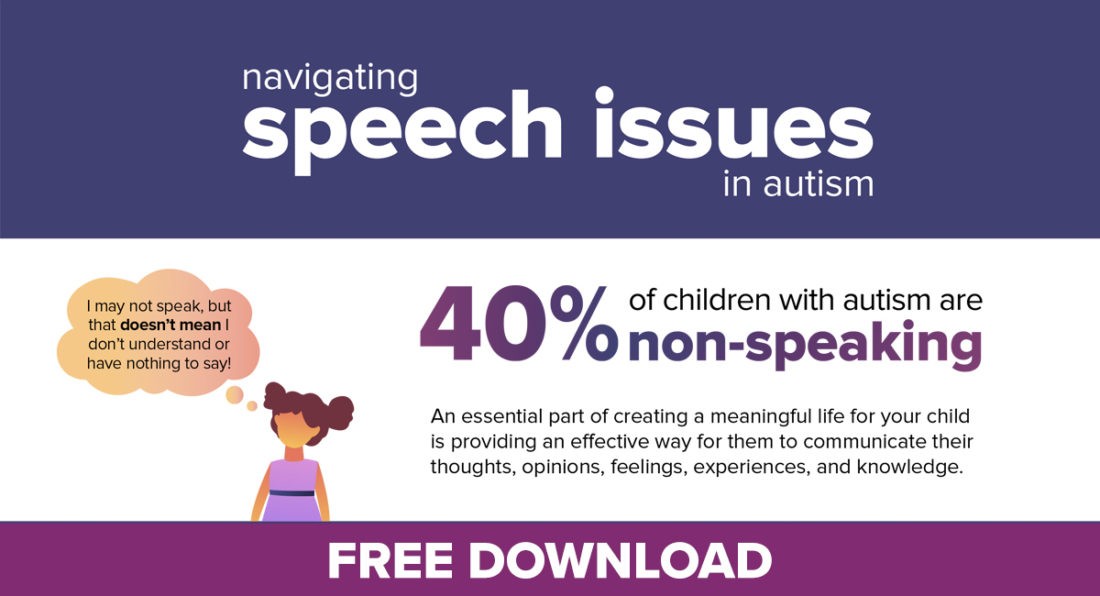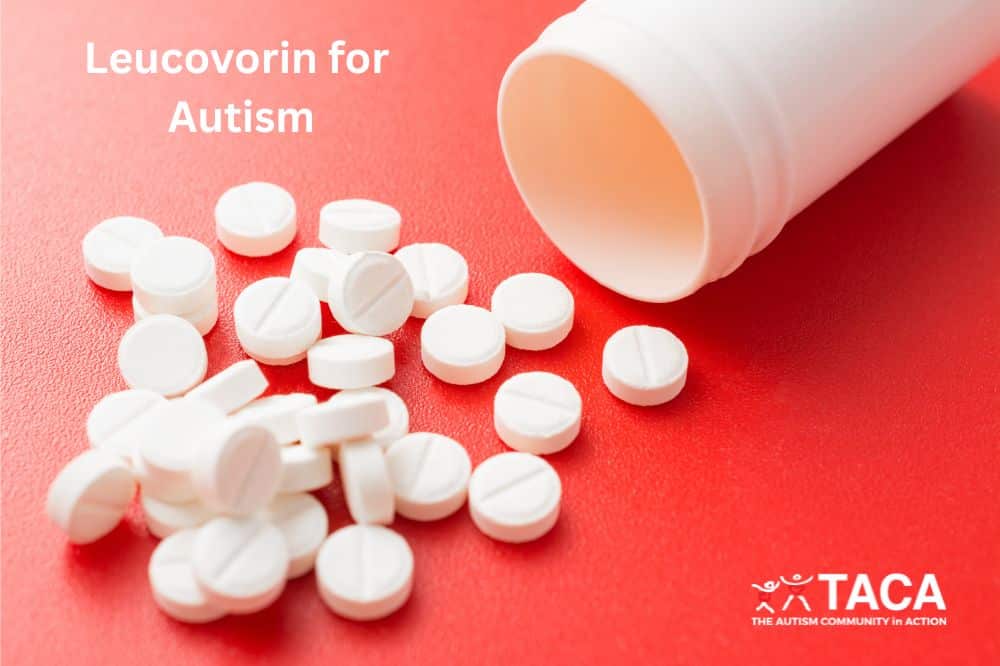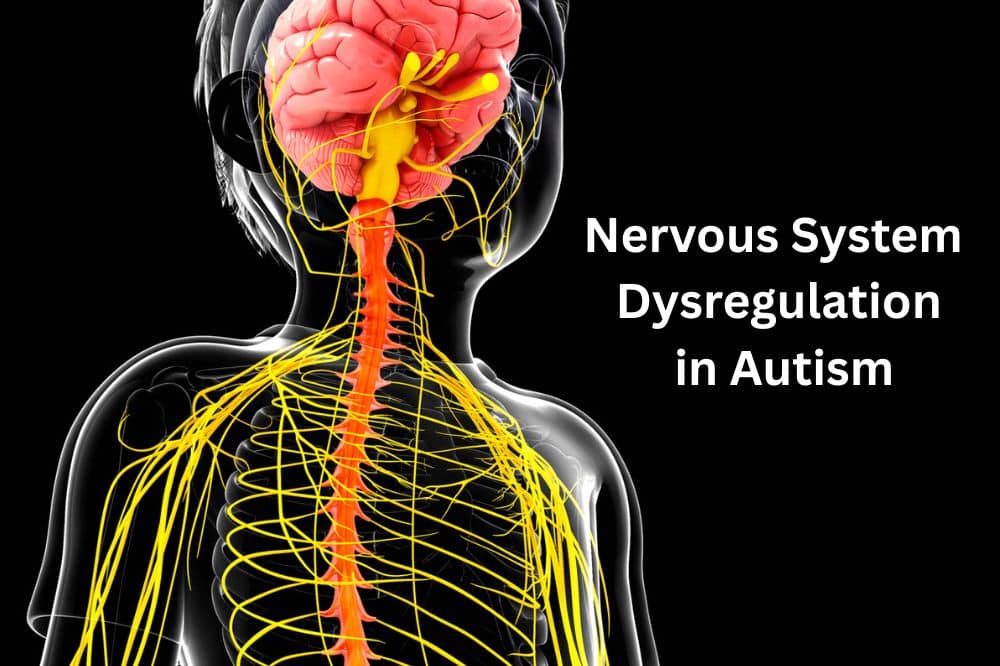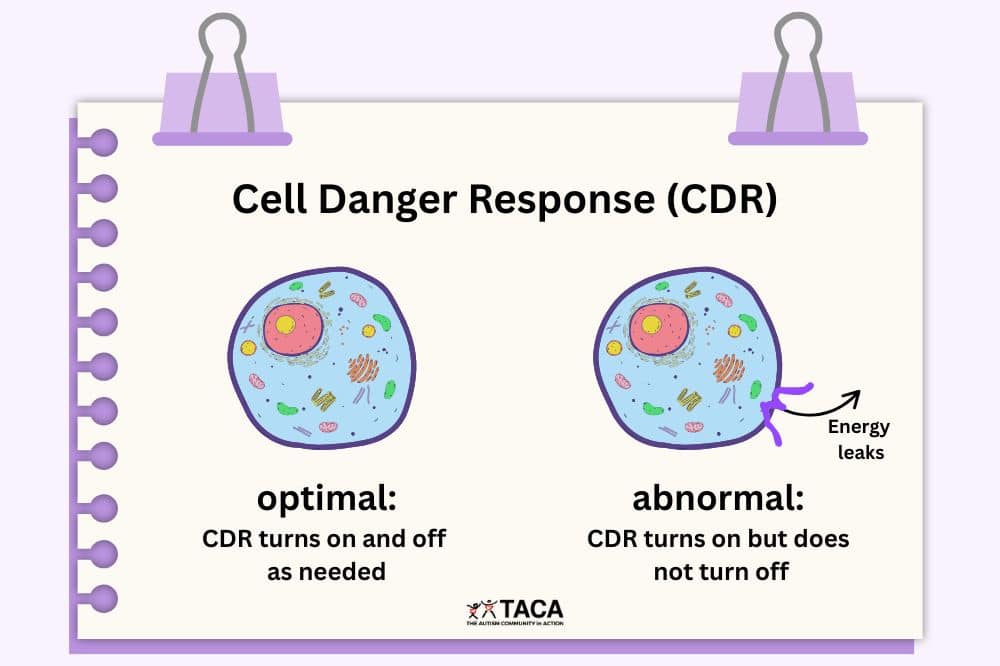Medical Causes of Speech Issues in Autism

All contents of this resource were created for informational purposes only and are not intended to be a substitute for professional advice, diagnosis, or treatment. Always seek the advice of your physician, therapist, or other qualified health providers with any questions or concerns you may have.
This article provides information about medical causes for speech issues in autism as well as treatment options.
Please note: There are two approaches to addressing speech issues in autism: medical and therapeutic. TACA recommends that parents seek to address speech issues from both approaches to achieve the best possible outcome for their child.
To learn more about the therapeutic approach, read “Therapeutic and Communication Options for Speech Issues in Autism“.

Medical Issues That Cause or Contribute to Speech Issues in Autism
Underlying medical conditions can cause or exacerbate speech issues in autism. Below you will find a brief description of some of these medical issues to discuss with your child’s physician. A good functional medicine practitioner, who is familiar with treating medical conditions common to autism, can help you on this journey.
Seizures
When determining if a medical condition causing or contributing to your child’s speech issues, it is important to evaluate for seizures. Seizure activity that occurs in the area of the brain that supports speech and language, will cause your child will experience communication difficulties.
Also, it is important for parents to understand that seizures are common to autism. In fact, it is estimated that up to 45% of individuals with ASD are affected by seizures by the time they reach adulthood, and up to 60% have subclinical electrical discharges—many without any obvious clinical seizures.
Unfortunately, seizures often go undiagnosed in individuals with autism. This happens for several reasons, but mainly because the symptoms of seizures mimic symptoms that we typically associate with autism, such as stimming, sleep issues, and motor tics.
Seizures may also be missed during the initial evaluation process. This can occur if your child’s neurologist relies solely on the results of a 30-minute EEG when checking for seizure activity. For example, unless your child happens to have a seizure during the 30-minute period they are hooked up to the EEG equipment, the doctor is likely to conclude that seizures aren’t an issue. But, what if your child only has seizures while they’re sleeping? For this reason, we recommend that every child with autism have at least a 24-hour EEG.
You can read more about seizures here.
Mitochondrial Dysfunction
Another medical condition, common to autism, that can cause speech issues is mitochondrial dysfunction. The prevalence of mitochondrial dysfunction among individuals with autism is high. To demonstrate, current research suggests it may be present in up to 80% of children with autism.
Symptoms of mitochondrial dysfunction vary. They include, but are not limited to, GI distress, headaches, fatigue, clumsiness, slow cognitive performance, slow processing speed, developmental delay or delay in growth, seizures, and more. However, you can alleviate many of these symptoms with a mitochondrial cocktail given at proper doses.
Click here to learn more about mitochondrial dysfunction.
Learn about lab testing for mitochondrial dysfunction here.
Cerebral Folate Deficiency (CFD)
Cerebral Folate Deficiency (CFD) can also cause or contribute to speech issues in autism. This is a relatively newly identified disorder in which there is low 5-MTHF (5-methyltetrahydrofolate) in the cerebrospinal fluid, but normal, or even elevated 5-MTHF, in the blood. In other words, the brain doesn’t have enough folate to function properly.
Symptoms of CFD include developmental delays, speech difficulties, sleep issues, irritability, and more. Treatment options include prescription medications (Leucovorin, Deplin, or both) and the elimination of dairy from the diet because mammal milk blocks folate receptors.
Click here to learn more about Cerebral Folate Deficiency.
Vitamin and Nutrient Deficiencies
The body needs sufficient amounts of specific vitamins and nutrients to perform certain functions. Speech is no exception to this rule. The good news is that, oftentimes, vitamin and nutrient deficiencies are easy to address.
Read this TACA article on Nutritional Deficiences in Autism to learn more.

Medical Causes of Speech Issues in Autism: Nutritional and Dietary Treatment Options
Nutritional and dietary interventions can alleviate many underlying medical problems that cause speech issues in autism. Below you will find a list of treatment options to discuss with your child’s functional medicine doctor.
Gluten Free Casein Free (GFCF) Diet
One of the easiest options for treating several medical problems that cause speech issues in autism is to modify your child’s diet. In fact, for over twenty years parents and clinicians have been reporting that the gluten-free, casein-free (GFCF) diet is the most beneficial intervention speech. Years ago, they were ridiculed for saying this, but that is no longer the case. This is because, today, you will find many studies that not only support those clinical experiences but explain the science behind them.
To clarify, the GFCF diet is merely a change of food. It is not invasive or dangerous. Furthermore, research shows it can help with cognition, sleep, focus, anxiety, behavior, and gastrointestinal issues in addition to speech. All things considered, if you can do something at home that is safe and may help your child, it is always worth a try.
Find more information about the GFCF diet in the following articles:
- Introduction to the Gluten-Free, Casein-Free, Soy-Free Diet
- Going GFCFSF in 10 Weeks!
- Top Reasons to Implement a Gluten-Free, Casein-Free Diet
Supplements That Have Been Proven to Help Alleviate Speech Issues in Autism
As mentioned above, vitamin and mineral deficiencies can cause or contribute to speech issues in autism. As a result, your doctor can use nutritional supplementation to address them.
Below, you will find a list of supplements that scientific research shows can help with speech.
Vitamin B12 (Cobalamin)
Vitamin B12 (cobalamin) is an essential vitamin that your body needs for many functions, including development, cognition, energy, and mood stabilization. Additionally, B12 connects the folate cycle to the methylation cycle and can be used to treat redox abnormalities.
- Study: Effectiveness of methylcobalamin and folinic acid treatment on adaptive behavior in children with autistic disorder is related to glutathione redox status
- Remarkable improvements were seen with B12 and folinic acid treatment (ex: six months of language improvement in three months!)
- Study: Randomized, Placebo-Controlled Trial of Methyl B12 for Children with Autism
- Study: Methyl B12 helps with speech, sleep, energy, processing speed (cognition), focus, and attention in some kids with autism
- Read more about Methyl B12 for Autism here.
Folinic Acid or 5MTHF (Methyltetrahydrofolate)
A lack of 5MTHF causes a functional folate deficiency and even cerebral folate deficiency. This can cause speech impairment. Accordingly, the supplements, folinic acid and 5MTHF, can address these deficiencies. Cerebral Folate Deficiency requires higher dosing.
It is important to note that folic acid and folinic acid are not the same. Folic acid can block folate receptors in the brain, making problems worse.
Omega-3 Fatty Acids
Omega-3 fatty acids are a family of essential fatty acids that help with speech and focus. Your body cannot produce omega-3 fatty acids on its own, so you must get them from your diet.
- Meta-analysis: Supplementation of omega 3 fatty acids may improve hyperactivity, lethargy, and stereotypy in children with autism spectrum disorders: a meta-analysis of randomized controlled trials
- Article: Fish oil capsules help children with speech disorders find their voices
L-Carnosine
L-Carnosine, is a naturally occurring amino acid found in high concentrations in muscle, heart, and brain tissues. Doctors use it when treating liver disease, Alzheimer’s disease, and cancer. In the study below, children with autism who were given L-Carnosine showed significant improvements in behavior, socialization, and communication, as well as increases in language comprehension.
Creatine
Creatine is an amino acid that supplies energy to muscles through the blood. By contrast, Creatinine is a biological waste formed by the metabolism of creatine and excreted from the body in urine. If creatinine is low, creatine may be low. According to Dr. Ben Lynch, if you have a child that is low muscle tone, not gaining weight, is low energy, and has a speech or developmental delay, then check their GAMT SNP. If they are ++ on this SNP, they may have a creatine deficiency.
- Find more information about creatine deficiency and its association with autism and speech delays here
- Learn more from Dr Lynch here
L-Carnitine
L-carnitine is an important amino acid that improves mitochondrial function, thereby possibly improving speech. It is available via prescription or over-the-counter.
- Study: A prospective double-blind, randomized clinical trial of levocarnitine to treat autism spectrum disorders
- Article: Researchers investigate a possible link between carnitine deficiency and autism
Ubiquinol (COQ10)
Ubiquinol is the bioavailable form of CoQ10. It helps the mitochondria produce energy and makes ATP, which your body needs to carry out all of its functions. In the study mentioned below, data results showed a 21% improvement in verbal communication with supplementation of ubiquinol.
Sulforaphane
Sulforaphane is a sulfur-rich compound found in cruciferous vegetables like broccoli. It is an anti-inflammatory that has many health benefits. The study cited below showed a 42% increase in verbal communication on Sulforaphane.
B6 (P5P) and Magnesium
B6 is a water-soluble vitamin your body needs to create red blood cells and neurotransmitters (P5P is the activated form of vitamin B6). Magnesium is an essential mineral that every cell in your body needs to function. Both magnesium and vitamin B6 play important roles in cognition and mood regulation.
Vitamin D
Many children with autism have a vitamin D deficiency. Testing your child’s vitamin D level is important because the level should be between 50 and 80. In the study linked below, 1529 patients with ASD, aged 3-18, were tested for Vitamin D deficiency. Vitamin D deficiency or insufficiency was found in approximately 95% of all patients. Furthermore, levels of vitamin D in kids with ASD ages 11 to 18 years old were significantly LOWER than those kids younger than 11 years.
Iron
The mineral iron plays an important role in cognitive and motor development. Iron deficiency may increase the severity of autism symptoms, including a lack of speech. Too much iron can be toxic, so you should NOT begin iron supplementation unless you’re under the care of a physician who is monitoring levels of both iron and ferritin (iron stores).
- Study: Iron deficiency parameters in autism spectrum disorder: clinical correlates and associated factors
Butyrate
Butyrate is a short-chain fatty acid. It has been shown to improve mitochondrial function, thereby possibly improving speech.
- Study: Butyrate enhances mitochondrial function during oxidative stress in cell lines from boys with autism
Kelly Dorfman’s Apraxia Protocol
A combination of phosphatidylcholine, Vitamin E, and Omega 3s has helped many kids with speech. Her protocol can be found here.
Conclusion
In short, there are many medical issues that can cause or contribute to speech issues in autism. However, these medical issues cannot be remedied with therapy alone. Therefore, it is important to look at speech intervention from both a therapeutic and medical approach. Doing so will improve your child’s outcome and quality of life. After all, when a person feels better, their ability to learn and develop new skills increases.
Finally, we understand that navigating speech issues in autism can be difficult. However, it is important to remember that difficult does NOT mean impossible. Especially when you have support. Please consider joining our online parent support group or signing up for a TACA parent mentor. Our volunteers do what they do because they don’t want anyone, including you, to have to travel this journey alone.
Additional Resources
Further Reading
Speech Articles:
- Introduction to Speech Issues in Autism
- Therapeutic and Communication Options for Speech Issues in Autism
Medical Articles:
- Underlying Medical Issues in Autism
- Mitochondrial Dysfunction in Autism
- Seizures in Autism
- Cerebral Folate Deficiency
- Top Reasons to Implement a Gluten-Free, Casein-Free Diet





